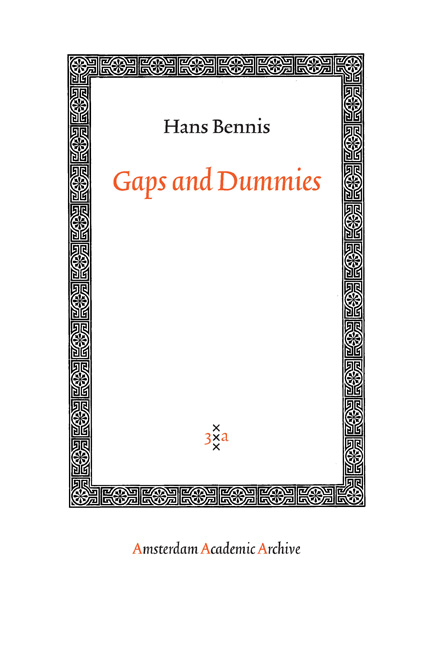Summary
In this study the syntactic properties are investigated of empty categories, i.e."gaps", and what are sometimes referred to as "semi-empty categories". i.e."dummies". Whereas the existence of lexical categories is relatively theory-neutral, it is clear that the existence of gaps and dummies is to a large extent determined by theoretical considerations. One can easily imagine a theory without empty categories and dummy pronouns. The theoretical framework adopted here is the Government-Binding Theory, as developed in Chomsky (1981,1982). Throughout this study I will assume familiarity with the central concepts of this theory, such as the notions of Universal Grammar, the Projection Principle, Government, the theories of Binding, Case and thematic roles, and so on. I shall not sketch these major theoretical assumptions here. For readers unfamiliar with GB-theory a rapid overview would be insufficient, while it would be superfluous for readers familiar with this theory.
GB-theory differs quite substantially from early transformational theories such as Chomsky (1957,1965). The main difference is that the centre of attention has shifted from rules to principles. Specific transformational rules have been replaced by the general rule schema "move α ". The application of this general rule is restricted by a variety of conditions, which are derived from the subtheories of Case, Government, Q-roles etc. Like transformational rules, phrase-structure rules have also been replaced by general concepts and principles. This development was initiated in Chomsky (1970) and has been developed further in Jackendoff (1977) and Stowell (1981).
As a consequence of these two changes the explanatory power of the theory has increased considerably. At the same time, however, these changes have led to an increase of the complexity of linguistic research. It is now no longer possible to study a particular aspect of a particular language in isolation. We have to take into account the whole theory with all its subtheories and all the intricate interconnections. A minor change in one of the principles of a subtheory might have various far-reaching consequences for other subtheories. Although this can be seen as a positive development that indicates the cohesion of the theory, it makes it rather difficult to evaluate a specific proposal and its consequences for the theory.
- Type
- Chapter
- Information
- Gaps and Dummies , pp. 1 - 6Publisher: Amsterdam University PressPrint publication year: 2005



